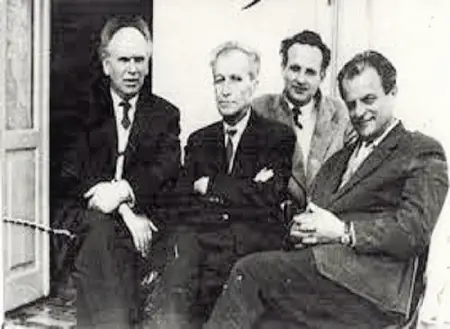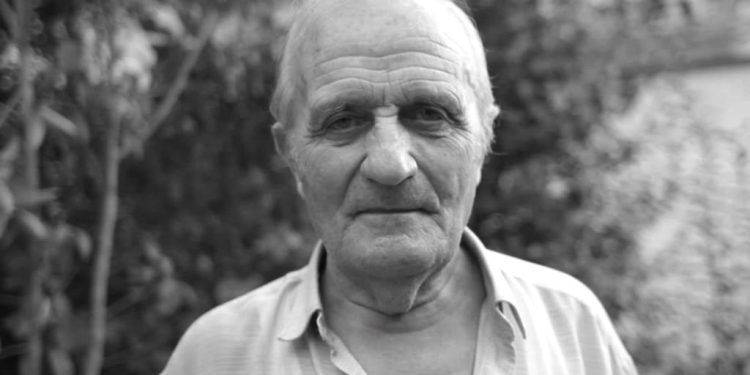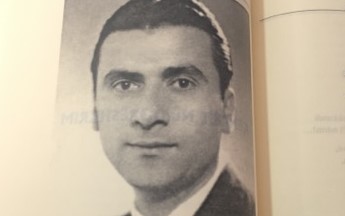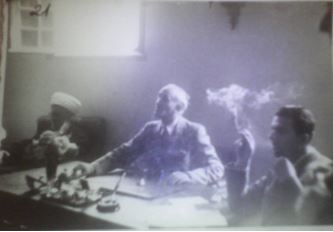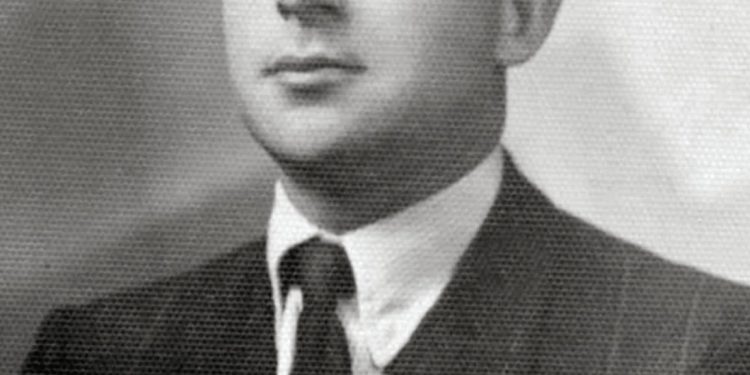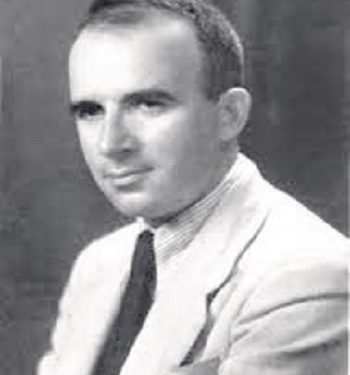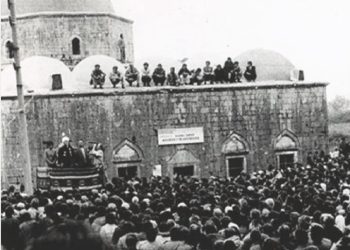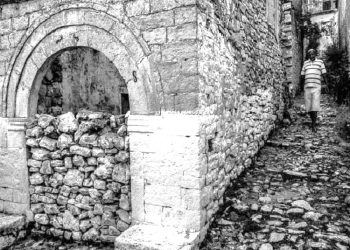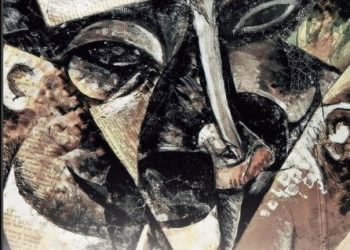By Islam Spahija
Part Four
Continued from the previous issue
Memorie.al / If we research the Albanian library, especially the literary one, it is impossible not to notice that of the poet, critic, translator and excellent pedagogue, Nexhat Hakiu, among the most prominent names of authors. We find this name in the immortality of the works he left behind, in the various temporary ones with cultural and historical values that he directed, in the school anthology compiled by him, as well as in some courageous and successful translations.
NEXHAT HAKIU, FIGURE DENIGRATE BY THE COMMUNIST DICTATORSHIP
But not only in these; His name is preserved in the hearts of his colleagues, admirers and especially the students he loved with a rare humanity, some of whom gathered a short time ago in a memorial meeting.
We feel that there are snobs or nihilists who have the property of denying the values of the past, but time, this “slow but sure friend of thinkers” – as Faik Konica said – time will be with us, if we will appreciate the values it creates. This is the reason that pushes us to remember and not forget the one who dedicated his entire life to the national ideal, who with his talent, created the precious work that, enriched the heritage of our literary art. Nexhat Hakiu was born on December 30, 1917 in Vlora, in the city of our great November 28, in the Vlora of epics, such as the legendary 1920s, and many others. Near the cliffs of its coast, where the waves of the Adriatic crash, his first inspirations were born, as he later recalled.
After completing his first studies at the famous “Vlora Commercial School”, he continued his studies at the Polytechnic Institute of Thessaloniki, where he graduated. He then served as a literature professor in high schools here, in his homeland.
The 1930s marked a very fruitful period in the field of literature; At that time, a powerful generation of intellectuals was developing, at this time, the renowned erudite and sociologist, Branko Merxhani, who was the director and owner of the monthly cultural magazine “PËRPJEKJA SHQIPTARE”, invited him and appointed him its editor-in-chief.
This magazine, being of a universal character, attracted prominent figures around it, such as Lasgush Poradeci, Vangjo Nirvana, “Lumo Skëndo” (Mit’hat Frashëri), Dhimitër Pasko (“Mitrush Kuteli”), Tajar Zavalani, Mustafa Kruja, etc.!
This magazine could be compared with its analog friends in the most advanced countries; this opinion has been expressed by those who, at least, we consider competent. He maintained the direction of this magazine until 1939, a black year for our country. In this same year, he published the volume of poems, “Këngët e Zemrës”, where he mainly sang of youthful longings.
Later, the well-known writer, Ernest Koliqi, who was the Minister of Education, called him and entrusted him with the direction of the literary magazine “SHKENDIA”, a position he held until 1941. Then he collaborated with Vangjel Koça, in the editorial office of the “REVISTA LETRARE”, together with Dhimitër Pasko, Sterio Spassane and Vedat Kokonën; a magazine that, although short-lived, had a great effect on the intellect of the art-loving element.
Collaborating in various press organs, from 1942 to 1944, he published patriotic poems dedicated to the bright figures of the nation, such as; Ismail Qemail, Isa Boletini, Aleksandër Moisiu, Fan Noli etc…! And behold, the Second World War finally ended and with it, the foreign occupation. But the ordeal of our country would enter a new phase, that of communist captivity.
And like many others, the nationalist Nexhat Hakiu was imprisoned in the first hours. “For Freedom/For Albania/for the red and black flag/For Kosovo and Chameria”, – he had written, so the Slavic-communist regime would never forgive him for this.
After leaving prison, always under the pressure of the dictatorship, he initially served in education, a duty he performed with honesty and high patriotism. The most brilliant period of his educational work, as he himself said was that of the “first graduation of the Artistic Lyceum” (1946-1950).
I myself was a student of that school at that time and, as such, I retain precious memories of my beloved teacher, so I feel a completely spiritual need to express them, but at the same time I see that compared to feelings and thoughts, words are powerless.
It is difficult for others, like me, to not retain the image of the literature professor who, through the memories of that boyhood, turned the lesson into a true artistic pleasure.
I would say with full conviction that the Albanian school at that time was fortunate to use anthologies compiled by Nexhat Hakiu. There were pearls of world literature, translated by the best Albanian masters.
How many times have we expressed regret for the end of literature class! In that environment where we lived and learned while listening to classical music, looking at paintings or sculptures, watching the graceful movements of choreographic art or the statements of future theater artists, there we also felt the magic of the poetic word.
This was, so to speak, a “catalyst for the fine arts that were studied there. Every time the literature professor would tell us a sentence by Dechamps: “Poetry is music that thinks, and painting that moves”. And we would debate this thought for a long time. Nexhat Hakiu was not only a poet, translator, etc., but as a teacher he was special.
Everywhere and whenever the professor was among us, smiling, loving, magical like poetry itself. This closeness, this trust did not at all affect his prestige in our eyes, on the contrary: this made him our most beloved teacher. But we must not forget that this beautiful thing was nothing more than a “Limbo” in the communist hell, as everywhere else, the infamous class struggle was being waged there. If we did not take this into account, then we would not understand that period.
Thus, the popularity of the literature professor among the students worried the organs of dictatorship. What was not done to denigrate his figure, but they could not achieve their goal. The Minister of Education at that time, during a speech, declared that; “Nexhat Hakiu instills a hostile spirit in the school youth, he did it right under our noses”. This speech was published in “Zërin i Popullit” (…) But the government, as its last card, had arbitrariness.
The ominous year would come, the year 1951, with the macabre farce of throwing a bomb at the Soviet Embassy in Tirana, a farce contrived to settle scores with the patriotic element. The wave of reprisals also swept away Nexhat Hakiu. This happened before the danger of execution, so the poet’s delicate heart felt the approach of death, as is said about Dostoevsky.
But fate had it that his innocence was recognized and he continued his previous duty, but this time at the “Qemal Stafa” gymnasium in Tirana. However, the persecution of the intellectual did not stop. The ideological absurdity, according to which “the class struggle does not go away by dying out, but by becoming increasingly severe in-finite”, would follow him every step of the way.
So he was removed from high school and transferred to the 8-year school and, after a few years, returned to the “Qemal Stafa” school, where he remained until he retired. The last period of his life, he finds far from the “intellectuals” of that time.
Disappointed by them, he prefers the company of ordinary people: bohemians or folk musicians. “Among them, I am finding rest and pleasure”, – he would say to his beloved wife, Lili. And so, on June 18, 1978, he dies of pulmonary emphysema, leaving behind his humble companion, with two daughters, Iris and Najada, as well as the son he had before, Ilir, who is now the head of the family and heir. In addition to his blood heirs, he left his literary work.
Professor Nexhati published in different periods of tension and difficulty: “THE SONG OF BLOOD”, “I SING”, “THE SONG OF THE FIVE”, “IN COMPETITION WITH THE SEASONS”, translations from Dante’s “Divine Comedy”, a series of studies and criticisms, such as those about Ali Asllani and Lasgush Poradeci, which were not published because they were deemed “inappropriate for the time”. In addition, he has written many literary or pedagogical articles, in various periods. /Memorie.al




